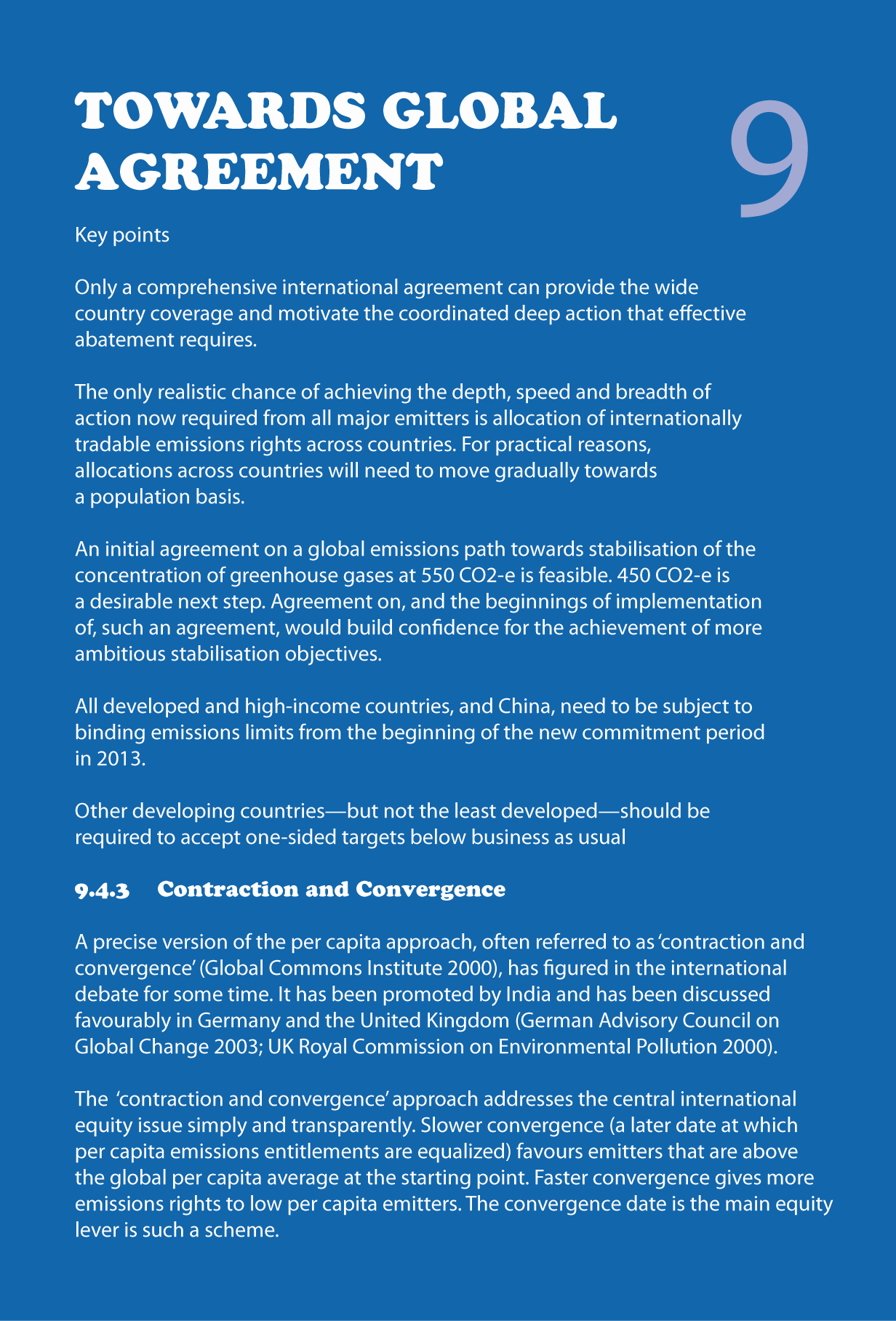Ross Garnaut
Having held senior academic and political positions all over Australia, Ross Garnaut
is currently a Professorial Research Fellow in economics at The University of Melbourne.
As such he has been a powerful C&C advocate and ally.

"A precise version of the per capita approach, often referred to as ‘contraction and
convergence’ (GCT 2000), has figured in the international
debate for some time. It has been promoted by India and has been discussed
favourably in Germany and the United Kingdom (German Advisory Council on
Global Change 2003; UK Royal Commission on Environmental Pollution 2000).
Recent reports have shown increasing support for variations on this general
approach, see for example, Stern (2008) and the Commission on Growth and
Development (2008).

"The contraction and convergence approach addresses the central international
equity issue simply and transparently. Slower convergence (a later date at which
per capita emissions entitlements are equalised) favours emitters that are above
the global per capita average at the starting point. Faster convergence gives more
emissions rights to low per capita emitters. The convergence date is the main equity
lever in such a scheme."
Global Commons Institute 2000,
‘GCI C&C Briefing’,
originally published as Meyer, A. 2000,
Engineering
Sustainability 157(4): 189–92.|||||
Garnuat Review - C&C Chapter

Ross Garnaut now argues for a ‘modified contraction and convergence framework’
The contraction and convergence approach has figured in the
international climate change debate since being developed by the
Global Commons Institute in the United Kingdom during the 1990s.
The approach has been promoted by India and discussed favourably in
Germany and the United Kingdom. Reports by Nicholas Stern and the
Commission on Growth and Development in 2008 supported variations
on this general approach pointing to the need for all countries to aim
for equal per capita emissions over the long term.
Garnuat Climate Change Review; Update 2011

The Garnaut Climate Change Review suggested an allocation of the global mitigation entitlements budget that was based on convergence towards equal per capita entitlements in 2050. The general approach of contraction and convergence (Global Commons Institute, 2000). The global emissions concentrations objective defines a global budget for emissions over a specified period. There needs to be an agreement on allocation of that budget amongst countries. Agreement has to be based on principles that are widely seen as being fair. Seen to be fair in rich and poor countries. Seen to be fair in rich countries which start with extremely high emissions per person, like Australia Canada and the United States, and in rich countries in which each person has far lower levels of emissions, like Europe, Japan and New Zealand. Seen to be fair in developing countries with rapidly growing economies like China, India and Indonesia, and in poor countries with stagnant or slowly growing economies as in many parts of Africa and the South Pacific. No proposal has any chance of being accepted as being fair through most of the developing world, and in my judgment in the world as a whole, unless it is based on the idea that each country’s entitlements to emit will converge on equal per capita levels at some time in the future. There will be widely different views of the time over which convergence should occur. There has been much international discussion of the Garnaut Review’s proposed basis for allocating entitlements. Some commentators in developing countries, including China, have said that 2050 is too long to wait for convergence (Project Team of the Development Research Centre of the State Council 2009).
Seventh Annual Whitman Lecture delivered at the Peterson Institute
Washington, DC December 1, 2009

Contraction and convergence
Since the principle of ‘contraction and convergence’ was first proposed by the Global Commons Institute in 2000, it has been widely embraced by some industrialised countries. Under contraction and convergence, each country will start out with emission entitlements equal to its current real emissions levels, and then, over time, converge to equal its per capita entitlements, while the overall global budget contracts to accommodate the emissions reduction objective. The convergence principle should be applied immediately rather than later as the ‘converged point’ in the future. ‘Real emissions’ is a different concept to ‘emissions entitlement’. A country’s high/low per capita real emissions cannot justify its high/low emission entitlements. In the process of convergence, the rights and interests of country B are really infringed by country A. In the NEA-based solution, the concept of convergence can still be incorporated, but it now merely means ‘convergence of real emissions’ rather than ‘convergence of emission entitlements’. Each country’s gaps between its emission entitlements and real emissions need to be balanced by the traded emissions quotas.
Greenhouse Gase Emissions Reductions - A Theoretical Framework & Global Solution
Development Research Centre State Council People's Republic China 2009
China's New Place in a World in Crisis Edited by Ross Garnaut

I suggested a set of principles in the 2008 Review, and
developed them in the Final Report in line with the structure of pledges in the
Cancun agreements. In brief, developed countries would accept commitments
to reduce emissions within a “contraction and convergence” framework. China
would deliver on its commitment to reduce the emissions intensity of output 40 to 45 percent between 2005 and 2020. Other developing countries would
accept emissions intensity targets that are as close as possible to the ambition
of the Chinese targets. When a developing country’s emissions per capita
reached the (falling) average levels of the developed countries, it would accept targets for absolute reductions within a contraction and convergence framework along the lines of the developed countries. The parameters of the commitments would be calibrated to achieve agreed climate objectives.
THE LIMITS TO ADAPTATION TO CLIMATE CHANGE
Ross Garnaut Vice-Chancellor’s Fellow and Professorial Fellow in Economics,
The University of Melbourne
Keynote Address, Four Degrees or More?
Australia in a Hot World, Melbourne, 13th July 2011
